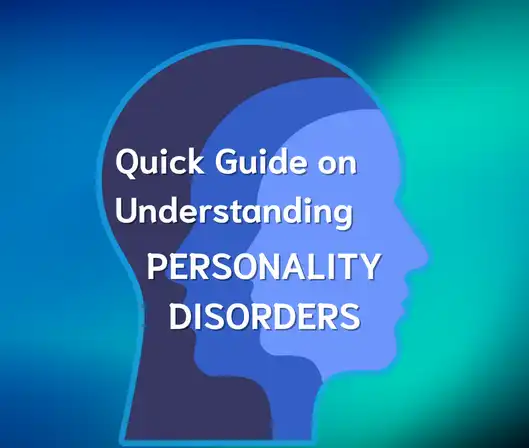

Quick Guide on Understanding Personality Disorders

What Are Personality Disorders?
A personality disorder is a long-lasting pattern of thinking, feeling, and behaving that is very different from what’s expected in society. These patterns can cause serious problems in relationships, work, and daily life. People with personality disorders aren’t “bad” or “broken”—they’re often struggling with deep emotional pain and difficulties in how they relate to others and the world.
Different Types of Personality Disorders
Experts group personality disorders into three categories, or “clusters,” based on the traits they share:
Cluster A – Odd or Unusual Behaviour
Paranoid Personality Disorder: Distrusts others, always on guard.
Schizoid Personality Disorder: Prefers being alone, emotionally distant.
Schizotypal Personality Disorder: Unusual thoughts or behaviour, may believe in “magical” thinking.
Cluster B – Dramatic or Emotional Behaviour
Borderline Personality Disorder (BPD): Struggles with mood swings, unstable relationships, fear of abandonment.
Narcissistic Personality Disorder (NPD): Has an inflated sense of importance, craves attention.
Antisocial Personality Disorder (ASPD): Ignores rules, may hurt others without guilt.
Histrionic Personality Disorder: Seeks attention, often through dramatic behaviour.
Cluster C – Anxious or Fearful Behaviour
Avoidant Personality Disorder: Extremely sensitive to rejection, avoids social contact.
Dependent Personality Disorder: Can’t make decisions without reassurance, heavily relies on others.
Obsessive-Compulsive Personality Disorder (OCPD): Rigid, perfectionistic, wants things done “just right” (different from OCD).
How Common Are Personality Disorders?
About 1 in 15 adults in Australia (around 6.5%) live with a personality disorder.
Obsessive-Compulsive Personality Disorder is the most common (about 3%).
Borderline Personality Disorder affects around 1 in 100 Australians.
These conditions are more common in people seeking mental health support—especially in hospitals or emergency services.

What Does It Feel Like to Have a Personality Disorder?
Living with a personality disorder can be emotionally exhausting. People might:
- Feel misunderstood or isolated
- Struggle with relationships
- React very strongly to stress
- Find it hard to trust people
- Have ongoing anxiety, depression, or emotional ups and downs
It’s important to remember: this isn’t a choice, and people with personality disorders often want support, not judgment.
How Are Personality Disorders Diagnosed?
Mental health professionals use a guide called the DSM-5, which lists clear criteria for each disorder.
To be diagnosed, the person must:
- Show long-term patterns of thoughts and behaviours that cause problems
- Have symptoms that started in adolescence or early adulthood
- Not have symptoms caused by other mental or physical illnesses
There’s also a newer model (used in Australia and globally) that looks at the severity of difficulties in relationships, emotions, and daily life, rather than ticking off a checklist. This helps create a fuller picture of someone’s experience.
Can Personality Disorders Be Treated?

Yes—absolutely. With the right treatment, many people see major improvements. Some people even recover to the point where they no longer meet the criteria for a disorder.
Effective Treatments Include:
- Dialectical Behaviour Therapy (DBT): Especially helpful for BPD; focuses on emotions and coping skills.
- Cognitive Behaviour Therapy (CBT): Great for anxiety-based disorders like OCPD or Avoidant PD.
- Schema Therapy: Helps change long-standing negative beliefs.
- Psychodynamic Therapy: Explores unconscious patterns that shape behaviour.
How Long Does It Take to See Change?
- Some people feel better after just a few months.
- For more complex issues, it can take 1–2 years of steady therapy.
- With early support, people with BPD can improve significantly in 5–10 years—many no longer meet diagnostic criteria by then.
How Can You Support Someone With a Personality Disorder?
- Listen without judgment
- Encourage them to seek help
- Set healthy boundaries
- Educate yourself—understanding reduces stigma
- Be patient—change takes time, but it’s possible

Ethical Practice and Mental Health Care in Australia & New Zealand
Mental health professionals in Australia and NZ follow strict codes of ethics. This means they are required to:
- Use evidence-based treatments (backed by research)
- Treat all clients with respect, compassion, and cultural sensitivity
- Protect client confidentiality and rights
- Stay up to date with training and best practices
If you’re seeing a registered psychologist, you can feel confident that your care is safe, professional, and guided by strong values.
Final Thoughts: There Is Hope
Personality disorders are complex, but not hopeless. With understanding, the right support, and evidence-based treatment, people with personality disorders can:
- Build healthy relationships
- Manage emotions better
- Feel more in control of their lives
- Recover and live meaningful, connected lives
If you or someone you know is struggling, reaching out for help is the first and most important step.
Resources You Can Trust
How Can Positive Mind Works Help?
At Positive Mind Works, individuals struggling with personality disorders can access compassionate, evidence-based care from experienced psychologists and psychiatrists—available both in-person and online. Whether you’re dealing with intense emotions, difficult relationships, or long-standing patterns that are hard to shift, our team uses proven therapies like Dialectical Behaviour Therapy (DBT), Schema Therapy, and Cognitive Behavioural Therapy (CBT) to help clients understand themselves better and make lasting changes. Our clinicians take the time to build trust, work through complex experiences at your pace, and support recovery in a non-judgmental, culturally sensitive environment. We also offer support for co-occurring issues like anxiety, depression, trauma, or stress—because mental health is never one-size-fits-all. You don’t need to figure this out alone—we’re here to walk alongside you.
Interested in Cognitive Behavioural Therapy? Consider reaching out to:
Stuart Langley or Harpreet Deol
Want to learn more about Schema Therapy? Get in touch with:
Valentina Markovska or Kathleen Mckinnon
Looking for more information about Dialectical Behaviour Therapy? Some of our staff who would be happy to help are:
Deb Kaita Kakiiza, Neha Golchha or Dr Naya Williams
Disclaimer
This blog is provided for general informational purposes only and is not a substitute for professional psychological advice, diagnosis, or treatment. If you are experiencing mental health challenges or believe you may be living with a personality disorder, please seek support from a registered psychologist, psychiatrist, or general practitioner.
Positive Mind Works complies with the ethical standards set by the Psychology Board of Australia and the New Zealand Psychologists Board, and is committed to providing evidence-based, respectful, and culturally sensitive care. All therapeutic approaches mentioned here (such as CBT, DBT, and Schema Therapy) are supported by clinical research and recognised mental health guidelines in Australia and New Zealand.
If you are in crisis or need urgent help:
In Australia, contact Lifeline on 13 11 14
In New Zealand, contact Lifeline NZ on 0800 543 354
Or visit your nearest emergency department

